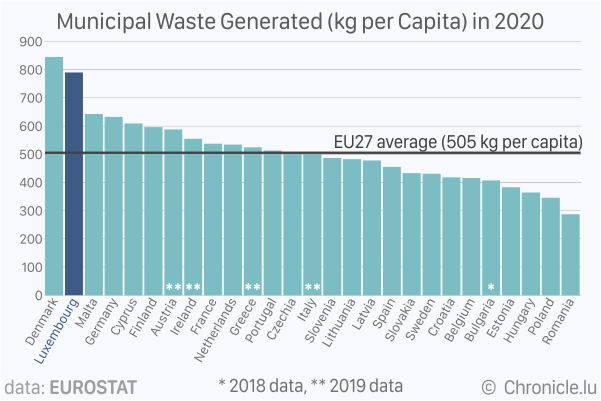
Data extracted from European statistics agency Eurostat have shown that Luxembourg residents generated 790 kg of municipal waste per person in 2020 - the second highest figure in the European Union (EU).
Municipal waste consists of waste collected by or on behalf of municipal authorities mainly from households and includes other sources such as shops, offices and public institutions. Municipal waste is disposed of through waste management systems depending on the different sorting systems in place including recycling, composting, landfill, energy recovery and inceration.
Denmark recorded 845 kg of municipal waste per capita, the highest in the EU, and Bulgaria reported the lowest at 287 kg per capita. The EU average in 2020 was 505 kg of municipal waste per capita. According to Eurostat, the variation between countries reflect differences in consumption patterns and economic wealth but also depend on how municipal waste is collected and managed. Some countries have different degrees of waste collected from commerce, trade and administration and managed together with waste from households. Moreover, some countries do not have coverage for their whole territory with a waste collection system and consequently, these countries provide an estimate of the waste generated from uncovered areas.
Luxembourg reported a figure that was almost similar to the previous year of 791 kg of municipal waste per person, but considerably lower than 815 kg per capita reported in 2016.
Of the 790 kg per capita waste generated in 2020 in Luxembourg, 418 kg (53%) was recycled (material recycling and organic composting) and 341 kg (43%) was used for energy recovery. In comparison, 48% of municipal waste was recycled (material recycling and organic composting) in the EU in 2020.
"Null Offall Lëtzebuerg" is a zero waste strategy presented in 2019 and 2020 with a framework for a more responsible and sustainable waste management in Luxembourg. It is based on the principles of the circular economy and a proposal of complete elimination of municipal waste landfill by 2030.








